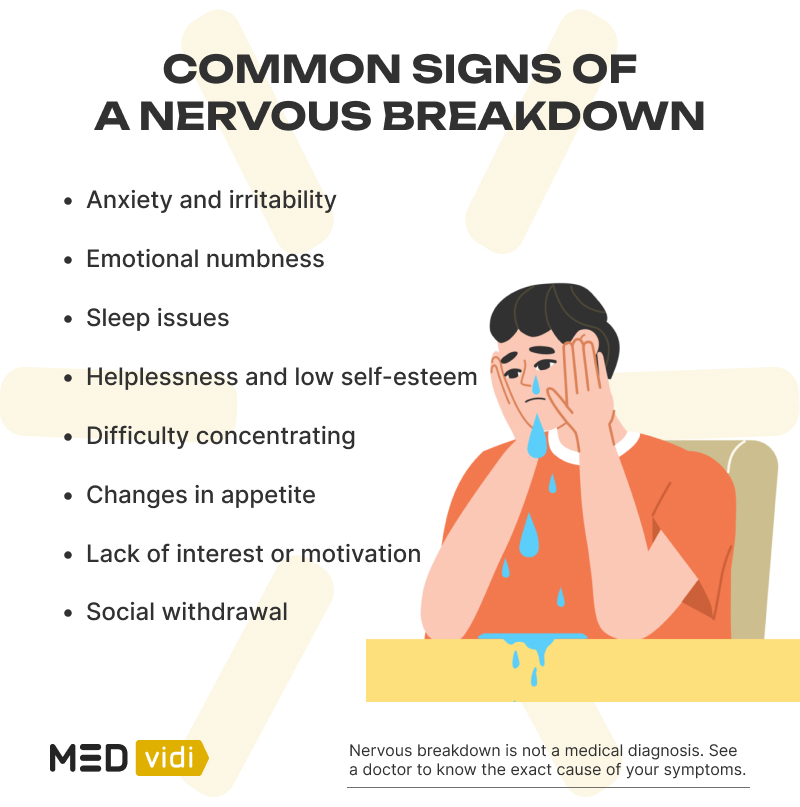Highlights
- A nervous or mental breakdown refers to a period of intense, extreme stress and anxiety demonstrating an inability to cope with daily life. This crisis may last for days, but it might not end too soon, and fighting back against this situation takes a huge amount of energy from you as well as time.
- A person may experience physical, psychological, and behavioral symptoms. These symptoms are intense to the point that they interfere with daily functioning.
- Treatment may involve coping skills, psychotherapy, medication, and even hospitalization depending on the severity of symptoms.
When the weight of stress is breaking you down do you feel like giving up?
We all do it when we are more or less stuck in an anxiety-fueled hamster wheel of overwhelming stress and fear with no end in sight. This is known as a nervous breakdown or mental breakdown. The prolonged stress and anxiety in a mental breakdown take you to the point where you are tired beyond belief—hopeless.
In this article, you will discover what happens when we hit rock bottom, signs you are not doing well and need help to heal from this mental collapse.
What Is a Mental or Nervous Breakdown
A nervous breakdown is like a computer system crashing, and you may feel drained and overwhelmed with sadness. The person experiencing a mental breakdown feels so stressed and depressed that they might feel there is no hope for them to do what they did before, like a job or other tasks in everyday life.
Those who are experiencing nervous breakdowns feel they cannot concentrate on anything and even have to neglect their own self-care. They may feel like they are “coming apart at the seams”. Mental breakdown lasts from days to weeks or even months and one needs effective coping strategies to overcome it.
How to Tell If You Are Having a Nervous Breakdown
A nervous breakdown can manifest itself in several different ways depending on the reason and context of the condition. However, common signs are both behavioral, emotional, and physical in nature.
Psychological Symptoms
A nervous breakdown is mainly about intense emotional struggles, including:
- Low concentration
- Panic attacks
- Low self-esteem
- Anxiety or irritability
- Angry outbursts
- Mood swings
- Depersonalization or feeling detached from the body
- Suicidal or self-harming thoughts
- Emotional numbness
If you’re experiencing suicidal or self-harming thoughts and require immediate assistance, contact a crisis hotline, such as 911, 988 suicide & crisis lifeline (toll-free), or Samaritans (116-123 or via chat).
Behavioral Changes
A mental breakdown is usually followed by changes in behavior—it is both a sign of emotional distress and a coping mechanism. These changes can be the following:
- Avoiding responsibilities
- Withdrawal from social situations or activities
- Missing deadlines
- Neglecting self-care like poor eating habits or poor hygiene
- Isolation or poor communication with others
- Increased tendency for substance abuse or addictive behaviors
- Engaging in risky or self-destructive behaviors

Physical Symptoms
During a mental breakdown, your body may react in different ways. The physical signs of a mental breakdown can be a cry for help, indicating that you are struggling to cope with your emotions. Look out for the following:
- Fatigue and exhaustion
- Changes in appetite
- Changes in sleep pattern
- Trembling or muscle tension
- Low immunity and frequent illness
- Stomach aches
- Sweating

What Can Cause a Mental or Nervous Breakdown
A mental breakdown is usually caused by severe stress and an inability to deal with that stress. A mental crisis is easily triggered by life traumas. These traumas may include the following:
- Losing a loved one
- Financial problems, such as excessive debt or foreclosure of the home
- Relationship issues (separation, divorce)
- Loss of job
- Problems at workplace
- Discrimination
- Moving places
- Mental or physical abuse
- Serious illness
- Natural disaster
The stress that people face in life traumas adds up down the line to a level where they cannot handle it and go about their daily routine. Individuals without support systems or psychological resources are more likely to break under the duress of chronic stress.
Moreover, a nervous breakdown can also denote a form of underlying mental health issues such as anxiety disorders, depression, PTSD, or panic disorder. These all contribute to a person’s
Is It Too Hard to Cope? It May Be the Time to Seek Help
Whenever it seems that you are on the verge of a nervous breakdown or if you see some other red flags like constant thoughts about worthless life and a constant feeling of despair, it is time to ask for help. If you avoid going to work or attending school; drink too much; have no desire to meet with friends or relatives; constantly find fault with everyone and everything; have sudden changes in your mood or have no mood at all as well as constantly experience headaches, stomachaches and other symptoms of unknown origin, you should go to see the therapist. In such a way, if you see that your ability to adapt to life or to stay in close relationships is limited, it is not that bad to go and ask for advice or help.
Diagnosis of a Mental or Nervous Breakdown
Mental breakdown is not a medical or official diagnosis. However, it is a serious issue, usually requiring professional help or even hospitalization. In some mild cases, a person can take certain steps to ease the impact of stress on the mind and body.
Although there is no single test to diagnose that a person is having a mental or nervous breakdown, there are some assessment tools that help a mental health professional understand what’s going on and rule out other underlying mental health conditions. These include:
- Psychological questionnaires: Surveys about feelings, behaviors, and thoughts.
- Mental status examination (MSE): An interview or assessment with the mental health professional in which they assess mood, thinking, and behavior.
- Symptoms checklist: It includes rating the intensity of your symptoms, like anxiety attacks and depression.
- Cognitive assessment: Evaluate your problem-solving skills, thinking, and memory.
- Physical examination: This is done to evaluate the physical signs related to mental health and to rule out any other symptoms.
Stages of Mental Breakdown
There are different stages of a mental breakdown. It is important to keep in mind that not everyone will experience each stage and the development might not follow a straight path in standard. A mental breakdown may progress in the following manner:
- Starting event: An important stress factor creates a situation where the emotional or mental distress is too much to handle.
- Escalation: Symptoms of distress further increase, the person experiences heightened feelings of anxiety and depression.
- Crisis: There comes what we might call a crisis where one is totally submerged within oneself now, it seems nearly impossible to find relief and may include self-harming thoughts.
- Appearance of physical signs: Symptoms including change in eating or sleeping routine, headaches, or lethargy can often accompany the psychological pain caused by stress.
- Reduced functioning: Daily life gets disturbed as it is very difficult to complete tasks at work or home.
- Isolation: One stops socializing and withdraws from contact with family, friends, or colleagues.
- Seeking help: Eventually, a person recognizes that they need assistance and should ask mental health professionals, family, or friends for support.
- Recovery: With appropriate treatment and guidance, it is possible to gradually restore the capacity to function normally.
Nervous Breakdown vs Panic Attacks
Panic attacks and nervous breakdowns may seem similar in nature but they are not.
Thus, a panic attack does not cause a person to stop functioning for a long period, it is a very specific type of stress reaction. On the other hand, a nervous breakdown comes from an abrupt or chronic period where stress overstates and causes significant changes in thinking and functioning.
A panic attack is characterized by chest pain, heart races, hyperventilation or shortness of breath, trembling and shaking, sweating profusely, dizziness, numbness, hot or cold flashes, or gastric disturbances. Nervous breakdowns are most commonly characterized by feelings of depression, lack of interest in any previously enjoyable activities, trouble sleeping, and fatigue.
Treatment for Mental Breakdown
The treatment you receive will depend on what is causing your symptoms and how severe they are. Treatment may include providing medications for anxiety, insomnia, or depression. Yet another common intervention is therapy to help develop better life coping skills and work through past traumas. A professional might suggest hospital admission for someone who is highly uncontrolled or has suicidal thoughts.

How to Prevent a Nervous Breakdown
Intense stress might feel persistent and infinite, yet it might not reach a nervous breakdown due to a great variety of factors, such as mental resilience. Other things that minimize the chances of having it, as well as make it simpler to deal with a mental breakdown, include the following:
- Exercising: Staying active is one of the best ways to avoid a nervous breakdown. Sport promotes the release of
endorphins[3] , and dopamine as you work out which, in turn, lowers the excessive stress levels. Moreover, it helps you to sleep better, and thus you are prepared for every day. Group sports are the best activity as they tackle feelings of isolation and increase confidence. - Meditate: Meditation is one of the best techniques for relieving stress as it helps to control your emotions. When you practice
meditation[4] , you need to think about the various things that you feel grateful for in your life. It could be your family or friends, good memories or dreams. There are many applications to guide you in starting meditation. The best thing is to allocate some time of the day to it to experience inner peace. - Practice yoga: Yoga is an ancient exercise that combines different elements to focus on physical, mental, and spiritual areas improving your health.
Yoga[5] is particularly useful because of stress-related conditions offering strength and flexibility. Some other benefits include being kind, improving self-control, and practicing empathy. It is also beneficial in that it reduces levels of cortisol easing other conditions related to stress and anxiety. - Practice deep breathing exercises: Deep breathing exercises slow down your breathing rate and reduce your heart rate and blood pressure, decreasing your level of stress. Controlling your breathing rate helps with the physical and emotional symptoms of a nervous breakdown. If you feel overwhelmed, panicked, or unable to cope with your emotions,
deep breathing exercises[6] can help. They can also help retrain your body’s stress response, so you calm down better in the long term. - Be kind to yourself: It is normal to feel depressed, sad, and anxious during a time of crisis. Even if your current situation does not seem to affect you as harshly as others, remind yourself that the negative feelings are temporary, and it’s important to be
self-compassionate[7] during a mental breakdown. - Consult a medical professional. If you have experienced the symptoms of a nervous breakdown for a while, see a medical professional. A mental breakdown may indicate another underlying mental condition that needs treatment. Your therapist or doctor will evaluate your symptoms and address other possible conditions you may have.
What to Do If Someone Is Having a Mental Breakdown
Seeing a person you care about getting a mental breakdown is heartbreaking, but you need to stay calm and focused. To begin with, try to calm them; this will offer them support and relax their mind towards the situation. Secondly, listen to what the person is saying attentively and make them feel that you understand and relate to what they are saying, but do not sound judgemental. Help them find a professional to help them, either a therapist or a trained counselor. If possible, help them visit a doctor immediately.
Give them a chance to pour their heart out to you, but don’t force them to talk if they’re uncomfortable talking to you. Tell them that they are not alone and that you will always want the best for them and will devote as much time to help them recover. But if the situation is worse, call upon the available emergency services for help. This can be your local mental health crisis line. These helplines operate round the clock and can offer the needed help.
Conclusion: Is Recovery After a Nervous Breakdown Possible
It is possible to recover from a mental breakdown with timely treatment and supporting lifestyle changes. Nervous breakdowns tend to be caused by stressful situations, so you can also try to prevent it using methods to relieve your tension such as meditation, exercise, and yoga. But if the negative thoughts are overpowering you and not allowing you to do anything, it is time for professional help.
FAQ
What does a nervous breakdown feel like?
What are the signs of a nervous breakdown in a woman?
What to do when you’re having a nervous breakdown?
Are mental and emotional breakdowns the same?
What is an emotional meltdown?
How can I break the cycle of anxiety?
Breaking the anxiety cycle requires patience and courage. You have to accept your feelings and identify triggers and try things like relaxation and mindfulness techniques to calm down or settle your emotions. If you are struggling, do not be afraid to seek help!











